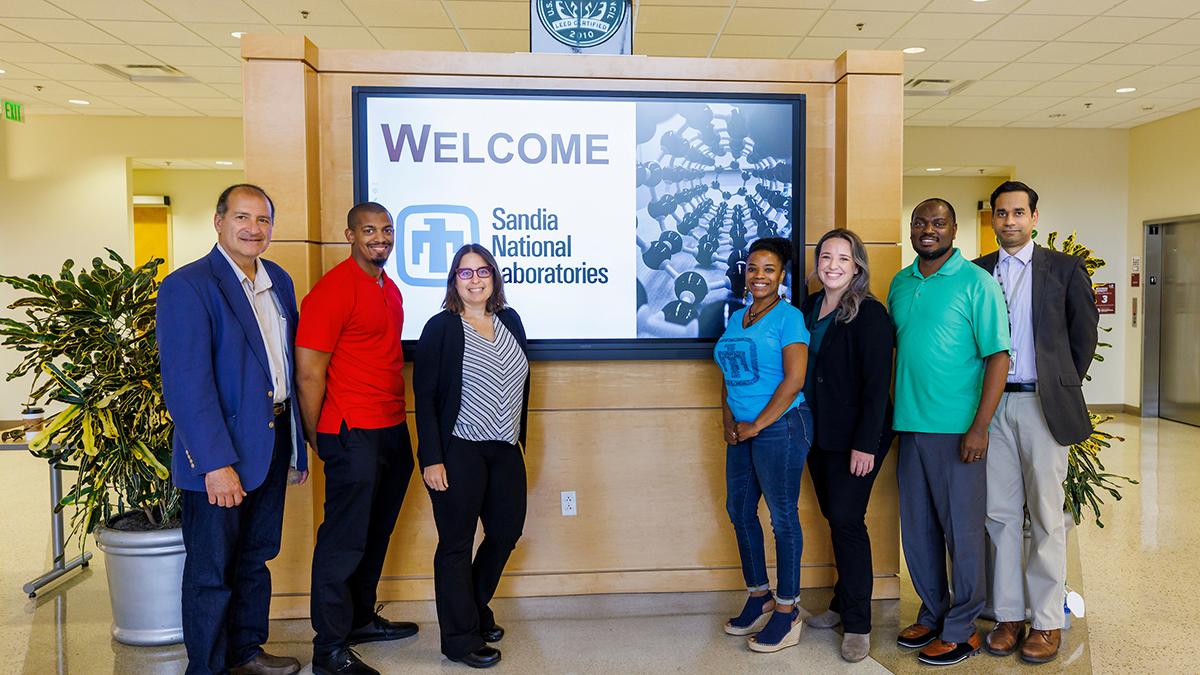
Sandia and joint college faculty pose during the Sandia National Labs group tour of the High Performance Materials Institute at the Florida A&M University-Florida State University College of Engineering. (Colin Hackley/FAMU-FSU College of Engineering)
This groundbreaking alliance exemplifies how HBCU engineering partnerships are shaping the future of scientific discovery and talent development
In a remarkable demonstration of how strategic university-industry partnerships drive innovation, the Florida A&M University (FAMU) and Florida State University (FSU) College of Engineering has established a comprehensive collaboration with Sandia National Laboratories. This transformative alliance represents a significant milestone in advancing engineering education, research excellence, and talent development through HBCU partnerships in 2025.
Cultivating Tomorrow’s Engineers: START HBCU Internship Excellence
The foundation of this partnership lies in Sandia’s START HBCU internship program, which successfully recruited six exceptional interns during the FAMU-FSU Career Fair earlier this year. This comprehensive program provides FAMU students with invaluable hands-on experience in cutting-edge research environments, positioning them at the forefront of emerging technologies.
The program’s expansion demonstrates the growing demand for diverse engineering talent. Plans are to welcome 15 additional interns this summer. These students will engage in impactful projects that build essential professional competencies and contribute to groundbreaking research initiatives addressing national security and technological advancement challenges.
Advancing Scientific Discovery: Coast 2 Coast Symposium Leadership

The 3rd Annual Coast 2 Coast Symposium on Advanced Manufacturing & Materials Science showcased the collaborative excellence driving this partnership forward. Organized by the National Nuclear Security Administration’s Minority Serving Institute Partnership (NNSA MSIPP) program and the Materials at the Extreme (MATE) consortium, this premier event highlighted cutting-edge research while providing essential networking opportunities for students and faculty with industry leaders.
Professor Charles Weatherford from FAMU, Professor Tarik Dickens from FAMU-FSU Engineering, and Professor Merlyn Pulokkathara from Prairie View A&M University made distinguished faculty contributions. Their presentations demonstrated the high-caliber research excellence that characterizes this collaborative ecosystem.
Pioneering Research Through Laboratory-Directed Development
The partnership’s research portfolio encompasses several groundbreaking Laboratory-Directed Research and Development (LDRD) projects that exemplify high-risk, high-reward scientific inquiry with significant community impact potential.
Infrastructure Resilience Innovation
A particularly impactful project addresses community-level effects of infrastructure service disruptions in the U.S. Gulf region. Led by Sandia Principal Investigator Shruti Khadka Mishra in collaboration with FAMU-FSU College of Engineering’s Professor Kassie Ernst and post-doctoral scholar Ivanna Pengelley, Ph.D., this initiative directly connects advanced scientific research with critical community needs, enhancing regional infrastructure and resilience strategies.

Materials Science Breakthroughs
The collaboration drives significant advances in crystallization processes for organic materials. Under the expert guidance of Sandia’s Principal Investigator Rekha Rao and FAMU-FSU Engineering faculty member Professor Z. Leo Liu, researchers are developing sophisticated simulation frameworks that establish critical links between processing conditions and material outcomes, fundamentally enhancing scientific understanding of crystal formation mechanisms.
Advanced Polymer Nanocomposite Development
FAMU-FSU Engineering continues advancing the frontiers of polymer nanocomposites research. Faculty member Professor Rebekah Downes and doctoral student Zipporah Harlan collaborate with Sandia Principal Investigator Nathan Moore to explore innovative techniques for creating advanced thin films from these sophisticated materials.
An additional project, led by Mary Alice Cusentino and University Principal Investigator Professor Rebekah Downes alongside doctoral students Aspen Reyes and Zipporah Harlan, focuses on developing revolutionary materials for fusion reactors. These materials must withstand extreme environmental conditions while maintaining structural integrity and thermal resistance properties, representing a critical advancement in sustainable energy infrastructure.

Biodefense Technology Innovation
Researchers at Sandia National Laboratories, including Principal Investigator Kimberly Butler, collaborate with Professor Tarik Dickens from FAMU-FSU Engineering and student researcher Patrick Williams to develop breakthrough rapid, sequence-based, multiplexed platforms for viral pathogen detection. Utilizing advanced metal-organic framework technology, this innovative platform enables rapid redesign capabilities to address emerging pathogens—a critical advancement for pandemic response preparedness and viral threat detection systems.
Their collaborative research efforts, conducted in partnership with the University of New Mexico and FAMU with significant contributions from postdoctoral researchers and interns, have been presented at major conferences, highlighting their substantial applications in national defense and pandemic preparedness.
Nanotechnology Leadership: CINT Summer Research Initiative
The FAMU-FSU College of Engineering plays a vital leadership role in the Center for Integrated Nanotechnology (CINT) Research Initiative Program for Summer 2025, providing students with immersive experiences in nanoscience and national security research applications.
Participating student intern Milan Rede exemplifies this program’s excellence, gaining mentorship from CINT scientist Dale Huber and internship Co-Leads Natalie Pitcher and Remi Dingreville while accessing state-of-the-art Sandia research facilities.
This initiative, in partnership with FAMU-FSU Engineering Professor Tarik Dickens, advances multi-material 3D printing capabilities through automated synthesis of polymer nanocomposites. The research also explores dual polymer synthesis optimization for applications in microfluidic reactors and assisted printing technologies, positioning participants at the forefront of additive manufacturing innovation.
Strategic Impact: Building Tomorrow’s Innovation Ecosystem
This comprehensive partnership between the FAMU-FSU College of Engineering and Sandia National Laboratories demonstrates how strategic collaborations advance scientific knowledge while cultivating the next generation of engineers and researchers. By effectively bridging academic excellence with industry innovation, this alliance establishes a powerful precedent for transformative partnerships that contribute to regional and national technological advancement and sustainability goals.
The collaboration’s success reflects the growing recognition of HBCU engineering programs’ excellence and their critical role in developing diverse talent pipelines for national security and technological innovation. As this partnership continues evolving, it promises to generate breakthrough discoveries, exceptional career opportunities, and lasting impact on both academic and industrial research communities.
Editor’s Note: This article was edited with a custom prompt for Claude 3.7 Sonnet, an AI assistant created by Anthropic. The AI improved clarity, structure and readability while preserving the original reporting and factual content. All information and viewpoints remain those of the author and publication. This disclosure is part of our commitment to transparency in our editorial process. Last edited: May 22, 2025.
RELATED ARTICLES
Researchers Awarded $1M to Unleash the Power of AI to Solve Important Microscale Challenges
Research Group Tests Novel Materials in Space
Research at the Extreme Helps Students Forge Their Path for a Career in 2030 and Beyond
